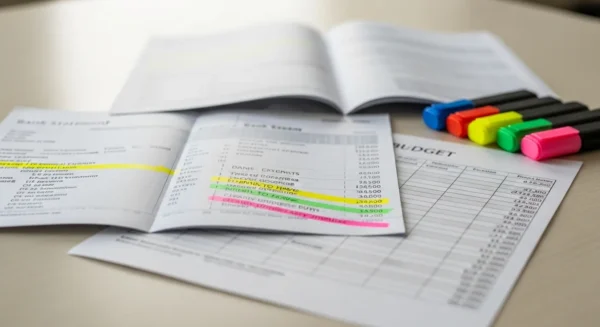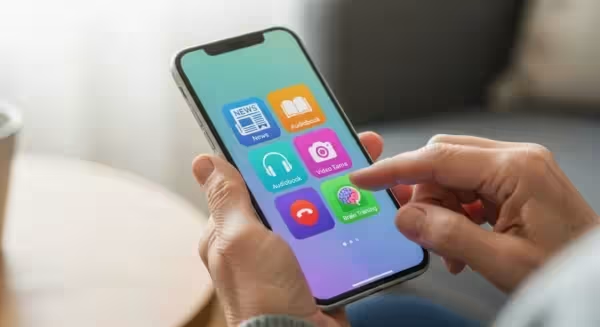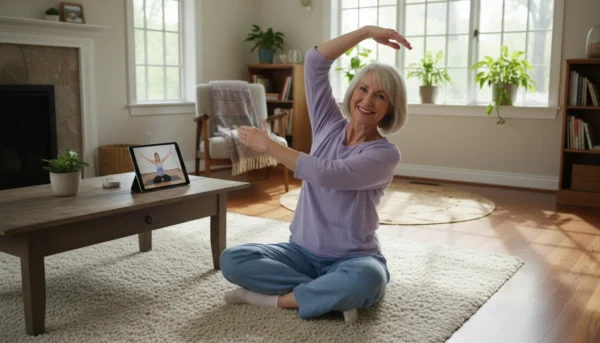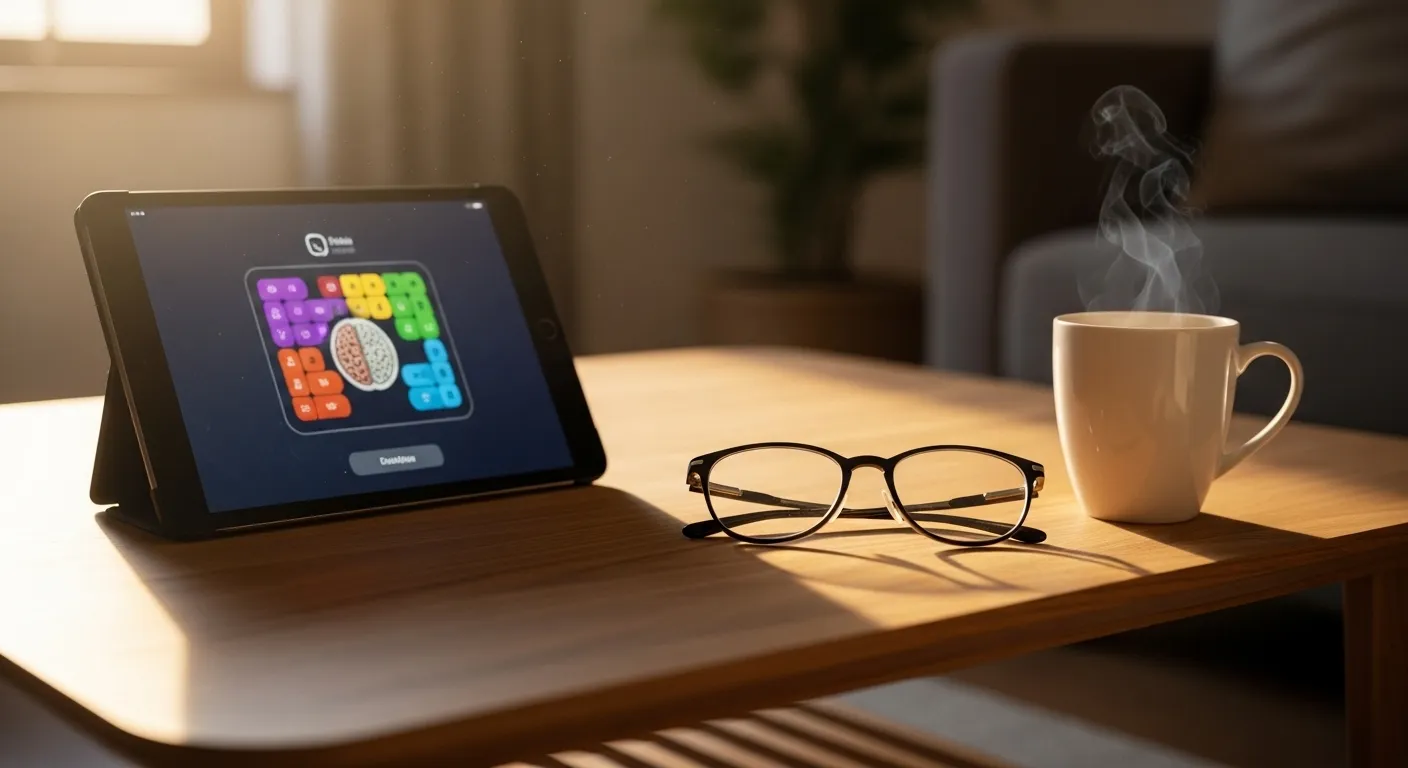
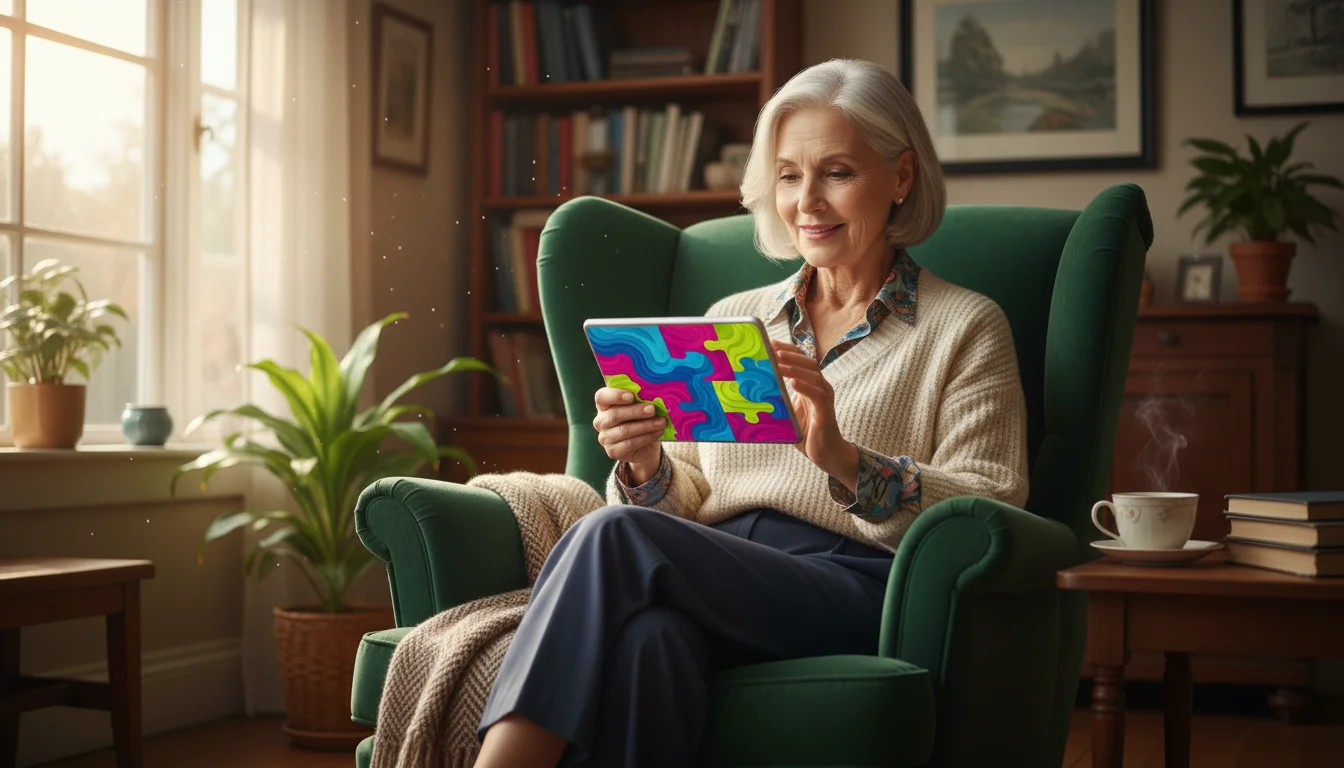
Introduction: Prioritizing Your Health with Brain-Training Apps
As we age, staying mentally sharp is just as important as staying physically active. For many of us, maintaining cognitive health is a top priority, as it directly impacts our independence, confidence, and overall quality of life. The ability to remember appointments, solve daily problems, and learn new things allows us to live fully and engage with the world around us. In today’s digital age, a new set of tools has emerged to help support this goal: brain-training apps.
You may have seen advertisements for these apps on your television or smartphone, promising to boost memory and improve focus through fun, engaging games. The idea is appealing—a simple, accessible way to exercise your mind from the comfort of your own home. But with so many options available, it can be difficult to know where to start, which apps are trustworthy, and how they fit into a broader wellness plan.
This article is designed to be your friendly guide to the world of brain-training apps. We will explore what these apps do, discuss their potential benefits and limitations, and offer a safe, step-by-step approach to choosing and using them. Our focus is always on your health and well-being. Think of these apps not as a magic solution, but as one of many valuable tools in your toolkit for a healthy and vibrant life. By combining new technology with timeless wellness practices, you can take proactive steps to care for your most important asset: your brain.
Authoritative health information for seniors is provided by the National Institute on Aging (NIA) and the Centers for Disease Control and Prevention (CDC).

Understanding the Health Benefits (and Any Risks)
Brain-training apps are designed to target and stimulate specific cognitive functions through a series of games and puzzles. This practice is often referred to as cognitive training. The goal is to challenge your brain in novel ways, which proponents believe can help strengthen neural pathways and improve mental agility. Let’s look at the potential benefits more closely.
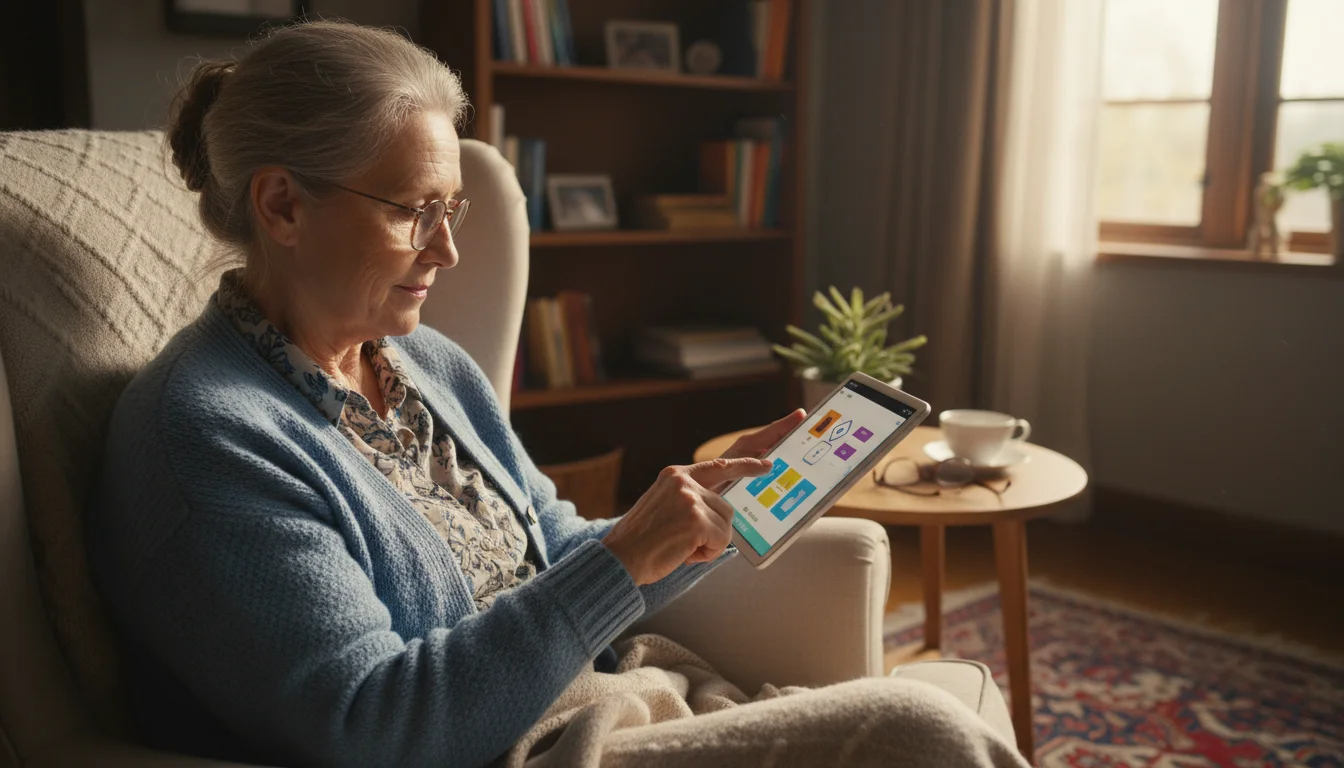
Potential Cognitive Benefits
Most brain-training programs focus on several key areas of cognition. By consistently engaging with these exercises, some users may notice improvements in:
- Memory: Many games are designed to challenge your short-term and working memory. This might involve remembering a sequence of items, recalling the location of objects, or matching pairs. These exercises act as digital memory boosters, helping you practice the mental muscle of recall.
- Attention and Focus: In a world full of distractions, the ability to concentrate is a valuable skill. Apps often include tasks that require you to filter out irrelevant information and focus on a specific goal, which can help sharpen your attention span over time.
- Problem-Solving: From logic puzzles to strategic planning games, these apps can challenge your ability to think critically and find creative solutions. This skill, often called executive function, is crucial for managing daily tasks and making sound decisions.
- Processing Speed: Some games are timed, encouraging you to think and react more quickly. While speed isn’t everything, improving how fast your brain processes information can make everyday activities, like following a conversation or driving, feel easier.
- Mental Flexibility: The ability to switch between different tasks or ways of thinking is another key cognitive skill. Brain-training games often require you to adapt your strategy as the rules change, which can help keep your mind nimble.

Understanding the Risks and Limitations
While these apps can be a fun and engaging part of a healthy lifestyle, it is crucial to approach them with realistic expectations and an awareness of their limitations. Health and safety come first, and that includes understanding what these apps can and cannot do.
- They Are Not a Cure: It is extremely important to understand that brain-training apps are not a medical treatment. They cannot prevent, cure, or reverse Alzheimer’s disease, dementia, or any other form of cognitive decline. These are serious medical conditions that require diagnosis and management by a qualified healthcare professional.
- The “Teaching to the Test” Effect: A primary debate among scientists is whether the skills learned in a brain game transfer to the real world. For example, getting very good at a memory game on an app might just make you better at that specific game, without necessarily improving your ability to remember your grocery list or where you left your keys. While some transfer of skills is possible, it is not guaranteed.
- Screen Fatigue and Eye Strain: Spending too much time looking at a smartphone or tablet screen can lead to eye strain, headaches, and dry eyes. It is important to use these apps in moderation, take frequent breaks, and ensure the lighting in your room is adequate.
- Frustration and Anxiety: Some games can be challenging, and if you find yourself becoming frustrated or stressed, it may be counterproductive. The goal is gentle stimulation, not a source of anxiety. If an app is making you feel bad, it is okay to stop using it.
- Cost and Subscriptions: Many popular brain-training apps operate on a subscription model. While they may offer a free trial, full access can be costly. Be cautious of apps that push you into expensive, automatically renewing subscriptions.
In summary, think of brain-training apps as you would a crossword puzzle or a game of Sudoku—a pleasant and stimulating mental activity. They are one component of a brain-healthy lifestyle, which should also include physical exercise, a balanced diet, social engagement, and quality sleep.

A Step-by-Step Guide to Choosing and Using Brain-Training Apps Safely
Navigating the world of technology can feel overwhelming, but with a clear, safety-first approach, you can confidently find and use senior apps that are a good fit for you. This guide will walk you through the process, ensuring your experience is positive and beneficial.
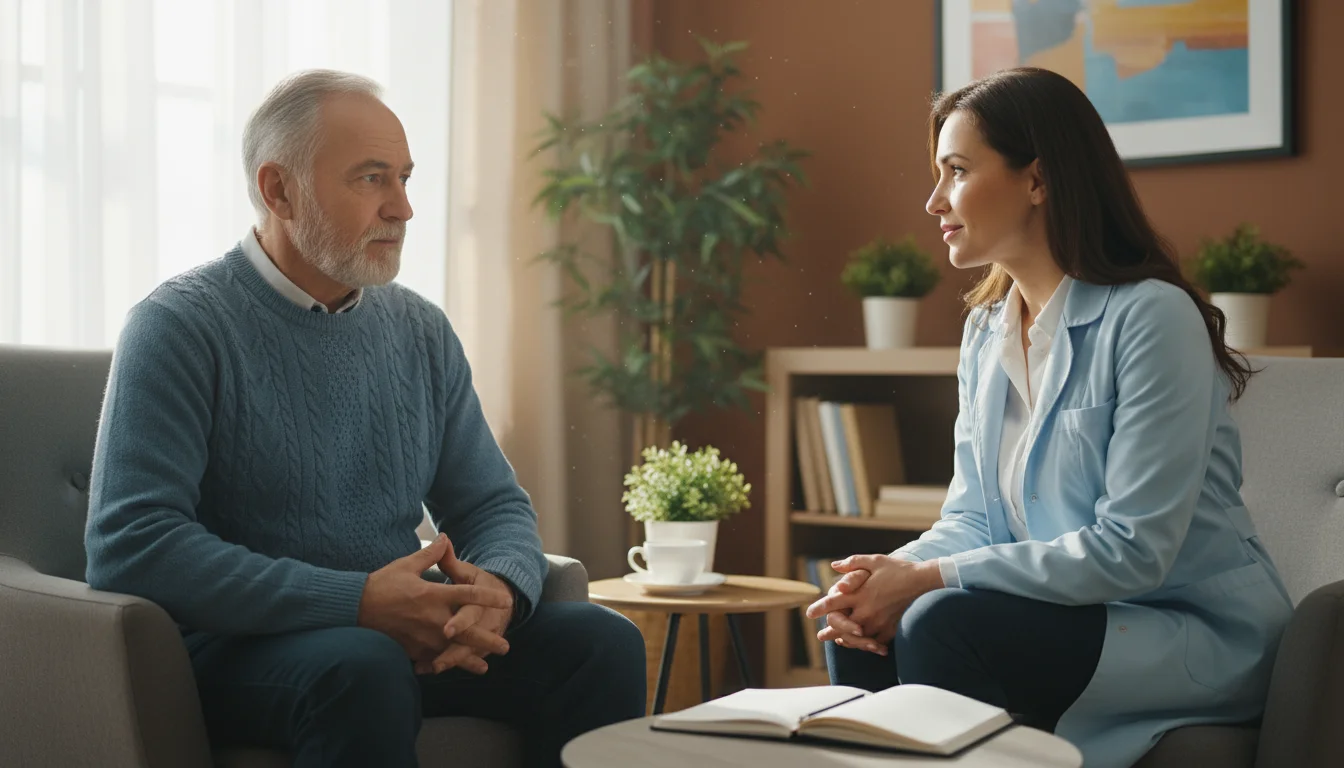
Step 1: Always Start with a Conversation with Your Doctor
Before you download any app or start a new wellness routine, the most important first step is to speak with your doctor, especially if you have any concerns about your memory or cognitive health. Your doctor can provide a proper evaluation, rule out any underlying medical issues, and offer personalized advice. They can help you set realistic goals and determine if cognitive training is an appropriate activity for your specific health situation. This conversation is the foundation of a safe and effective wellness journey.

Step 2: Identify Your Personal Goals
What do you hope to gain from using a brain-training app? Taking a moment to think about your goals will help you choose the right tool. Are you looking to:
- Challenge your memory with fun recall games?
- Improve your focus and attention for reading or hobbies?
- Work on problem-solving and logical reasoning skills?
- Simply find a new, engaging, and mentally stimulating activity?
Knowing what you want to achieve will make it easier to sift through the many options and find an app that aligns with your interests and needs.

Step 3: Explore a Few Reputable Apps for Seniors
There are hundreds of brain-training apps available, but not all are created equal. Look for apps that are well-established, have positive reviews, and are designed with user-friendliness in mind. Here are a few examples known for their quality and accessibility. We are not endorsing any single app, but providing these as a starting point for your research.
Lumosity: One of the most well-known brain-training apps, Lumosity offers a wide variety of games focusing on memory, attention, speed, flexibility, and problem-solving. The games are often bright and engaging.
- Good for Seniors because: It provides a personalized training program that adapts to your performance, so it remains challenging but not overwhelming. The interface is relatively clean and easy to navigate.
- Things to Consider: The free version is quite limited, and a subscription is needed to unlock the full program.
Elevate: This app focuses on practical, real-world skills like reading comprehension, writing clarity, and even math. The games are designed to feel more like educational tools than abstract puzzles.
- Good for Seniors because: The emphasis on everyday skills can feel very practical. It features a clean design with clear instructions and allows you to track your progress in different skill areas.
- Things to Consider: Like Lumosity, a subscription is required for full access to all its games and features.
CogniFit: This app has a more clinical feel and was developed with input from neuroscientists. It offers a detailed assessment to identify your cognitive strengths and weaknesses, then tailors a training program for you.
- Good for Seniors because: It provides in-depth performance tracking and targets over 20 different cognitive skills. It’s a good choice if you are interested in a more data-driven approach to your cognitive training.
- Things to Consider: The sheer amount of information can be overwhelming for some users. It also operates on a subscription model.
AARP Staying Sharp: This program, offered by the AARP, is part of a larger platform focused on the six pillars of brain health. It includes a variety of games, articles, recipes, and activities.
- Good for Seniors because: It comes from a trusted organization focused on older adults. The content is specifically tailored to a senior audience and takes a holistic view of brain health beyond just games.
- Things to Consider: Full access is typically a benefit for AARP members, so it may require a membership.

Step 4: Getting Started Safely and Comfortably
Once you’ve chosen an app to try, follow these tips for a safe and enjoyable experience:
- Start Slowly: Begin with just 10-15 minutes a day. This is enough time to engage your brain without causing fatigue or frustration. You can always increase the time later if you feel comfortable.
- Create a Comfortable Environment: Use your tablet or phone in a well-lit room to reduce eye strain. Sit in a comfortable chair that supports your back. Consider adjusting the font size on your device to make it larger and easier to read.
- Take Breaks: Remember the 20-20-20 rule. Every 20 minutes, look at something 20 feet away for at least 20 seconds. This simple habit helps rest your eyes.
- Don’t Get Discouraged: The purpose of these games is to challenge you. It’s perfectly normal to not get a perfect score. Focus on the process and the enjoyment of learning, not just the outcome.
- Be Wary of In-App Purchases: Many free apps will prompt you to buy special features or “power-ups.” It’s best to ignore these. Be especially cautious about subscription trials that automatically renew. Read the terms carefully before signing up for anything.

Key Signs It’s Time to Consult a Doctor
While normal age-related memory changes, like occasionally misplacing your glasses or forgetting a name, are common, some signs may indicate a more serious issue. Brain-training apps are for mental exercise, not for diagnosing or treating a medical condition. It is essential to seek professional medical advice if you or a loved one experiences any of the following red flags.
Please contact your physician immediately if you notice:
- Significant Memory Loss That Disrupts Daily Life: This is more than forgetting an appointment; it’s repeatedly asking for the same information, relying heavily on memory aids for things you used to handle yourself, or forgetting important recent events entirely.
- Difficulty with Planning or Solving Problems: A sudden challenge in following a familiar recipe, managing a monthly budget, or keeping track of bills when this was never an issue before.
- Trouble Completing Familiar Tasks: Feeling confused while driving to a familiar location, having trouble remembering the rules of a favorite card game, or finding it difficult to operate a familiar appliance like the microwave.
- Confusion with Time or Place: Losing track of dates, seasons, or the passage of time. You might forget where you are or how you got there.
- New Problems with Words in Speaking or Writing: Frequent trouble finding the right word, calling things by the wrong name (e.g., calling a “watch” a “hand-clock”), or stopping in the middle of a conversation with no idea how to continue.
- Poor Judgment or Decision-Making: This could manifest as unusual decisions regarding money, paying less attention to personal grooming and hygiene, or a noticeable decline in judgment.
- Withdrawal from Social Activities: A loss of interest in hobbies, social gatherings, or family events. This could be due to the difficulty of following conversations or feeling overwhelmed.
- Changes in Mood and Personality: Becoming unusually confused, suspicious, depressed, fearful, or anxious. You might also notice becoming easily upset at home, with friends, or in places where you are out of your comfort zone.
These symptoms are not something to ignore or self-diagnose. An early and accurate diagnosis from a healthcare professional is the most important step you can take. It allows for the proper management of treatable conditions and provides access to resources and support for conditions that are not reversible.

Making It a Part of Your Daily Routine
The key to seeing any potential benefit from brain-training apps, much like physical exercise, is consistency. Making it a regular habit is more important than spending hours on it sporadically. Here are some simple, practical tips for weaving these mental exercises into your daily life.
- Pair It with an Existing Habit: The easiest way to build a new routine is to link it to an old one. Try doing your daily brain training while you enjoy your morning coffee or tea, right after you finish reading the newspaper, or for a few minutes before you watch your favorite evening television show.
- Put Your Device in a Visible Place: If you use a tablet for your games, leave it out on your kitchen table or a side table where you’ll see it. This visual cue can remind you to take a few minutes for your cognitive training.
- Make It a Social Activity: If you have a friend, partner, or family member who is also interested, you can do it together. You can compare scores in a friendly way or simply encourage each other to stay consistent. This adds a wonderful social element to the activity, which is also excellent for brain health.
- Focus on Enjoyment: Choose an app with games you genuinely find fun and interesting. If it feels like a chore, you are less likely to stick with it. Don’t be afraid to try a different app if the one you’re using isn’t holding your interest. The goal is positive mental engagement, not a stressful task.
- Listen to Your Body and Mind: On days when you feel tired or aren’t in the mood, it’s okay to take a break. Consistency is important, but so is being kind to yourself. A healthy routine is flexible and doesn’t add stress to your life.
– Set a Specific, Modest Goal: Instead of a vague goal like “I’ll use the app more,” be specific. For example, “I will complete three games on my app every day.” A small, achievable goal builds momentum and makes the habit stick. Ten to fifteen minutes a day is a wonderful target.

Frequently Asked Questions
1. Can brain-training apps prevent Alzheimer’s disease or dementia?
This is the most important question, and the answer is clear: No. Currently, there is no scientific evidence to suggest that any app or game can prevent, cure, or reverse Alzheimer’s disease or other forms of dementia. These are complex medical conditions. While engaging in mentally stimulating activities like brain training is part of a brain-healthy lifestyle recommended by experts, these apps should be seen as a supportive tool for general cognitive fitness, not as a medical treatment or preventative measure. Always consult a doctor for concerns about dementia.
2. Are the free brain-training apps as good as the ones that require a paid subscription?
Many free apps can be quite good and offer a solid variety of games. The primary difference is that free versions are often supported by advertisements, which can be distracting, or they may limit the number of games you can play each day. Paid subscription apps typically offer a more polished, ad-free experience with personalized tracking and a wider range of activities. A good strategy is to start with a free app or the free trial of a paid app. This allows you to see if you enjoy the format before committing to a subscription. The “best” app is the one you find easy to use and enjoy enough to use regularly.
3. How much time should I spend using these senior apps each day?
Most experts and the apps themselves recommend short, consistent sessions. A great starting point is 10 to 15 minutes per day, about 3 to 5 times a week. This is enough time to challenge your brain without leading to screen fatigue, eye strain, or frustration. It is more effective to have a short, focused session regularly than to spend an hour on the app once a week. Listen to your body—if your eyes feel tired or you feel mentally drained, it’s time to take a break.
4. Does Medicare cover the cost of brain-training apps?
In general, original Medicare (Part A and Part B) does not cover the cost of brain-training apps or other wellness programs. These are typically considered non-medical services. Some private Medicare Advantage (Part C) plans may offer supplemental wellness benefits that could potentially include subscriptions to health or fitness apps, but this is not common. It is best to assume you will have to pay for these apps out of pocket. For specific questions about your coverage, it is always best to refer to official sources. For insurance and medical coverage questions, refer to Medicare.gov.
5. Besides apps, what are other effective ways to keep my brain sharp?
Technology is just one tool! A holistic approach is always best for brain health. Other scientifically-supported methods include:
- Regular Physical Exercise: Activities like walking, swimming, or dancing increase blood flow to the brain.
- A Healthy Diet: A balanced diet rich in fruits, vegetables, and healthy fats (like the Mediterranean diet) is linked to better cognitive function.
- Social Engagement: Staying connected with friends, family, and your community is a powerful way to keep your brain active and healthy.
- Lifelong Learning: Challenge your brain by learning a new skill, like a musical instrument, a new language, or a craft.
- Getting Quality Sleep: Sleep is when the brain clears out toxins and consolidates memories. Aim for 7-9 hours per night.
For mental health support, consult the National Institute of Mental Health (NIMH).
Disclaimer: This article is for informational purposes only and does not constitute medical advice. The content is not intended to be a substitute for professional medical advice, diagnosis, or treatment. Always seek the advice of your physician or other qualified health provider with any questions you may have regarding a medical condition.
|
Fact-Checked Content
Our editorial team reviews all content for accuracy and updates it regularly. Learn about our editorial process →
|




